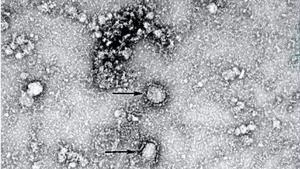 Electron microscopic images of the first strain of the novel coronavirus released by the Chinese Center for Disease Control and Prevention on Jan. 24, 2020. (CHINESE CENTER FOR DISEASE CONTROL AND PREVENTION / XINHUA)
Electron microscopic images of the first strain of the novel coronavirus released by the Chinese Center for Disease Control and Prevention on Jan. 24, 2020. (CHINESE CENTER FOR DISEASE CONTROL AND PREVENTION / XINHUA)
GUANGZHOU - Two separate research groups led by China's top scientists said they had isolated novel coronavirus strains from samples of infected patients' feces, but further study is needed to prove the existence of fecal-oral transmission.
Researchers from multiple organizations, including the State Key Laboratory of Respiratory Disease under Guangzhou Medical University, have successfully isolated a strain of virus from swab sample of an infected patient's feces, said Zhao Jincun, a member of Chinese respiratory expert Zhong Nanshan's research group, at a press conference Thursday.
ALSO READ: Coronavirus: China sees 15,152 new infections, 254 more deaths
More scientific researches are also entailed concerning the level of infectivity and whether the virus in feces was swallowed by patients or from intestinal cell proliferation, as well as its relationship with blood, sputum and the occurrence and development of diseases
Wu Nanping, Deputy director, the State Key Laboratory for Diagnosis and Treatment of Infectious Diseases
The swab sample was provided by the Fifth Affiliated Hospital of Sun Yat-Sen University, said Zhao, also a professor with the laboratory.
Meanwhile, a research team led by Li Lanjuan, a renowned Chinese epidemiologist, also isolated novel coronavirus strains from stool specimens of infected patients. Three of the five feces samples tested positive, according to Wu Nanping, deputy director of the State Key Laboratory for Diagnosis and Treatment of Infectious Diseases, Zhejiang University.
"We made the discoveries in the laboratory, which still need further confirmation by epidemiologists. More scientific researches are also entailed concerning the level of infectivity and whether the virus in feces was swallowed by patients or from intestinal cell proliferation, as well as its relationship with blood, sputum and the occurrence and development of diseases," Wu said.
According to Zhao, the discovery confirmed that the patients' feces contained the live virus, but it still lacks sufficient evidence for the existence of fecal-oral transmission.
Transmission through means of respiratory and contact remain the major routes of the novel coronavirus spreading, said Mi Feng, an official with the National Health Commission, at a press conference Thursday.
Despite digestive tract problems of some patients, either as incipient symptoms or complications, the main clinical symptoms of the disease are fever, general weakness and dry cough, Mi said, adding that the coronavirus isolated from patients' feces is not yet illustrative to prove the change of the transmission route.
READ MORE: Antiviral materials made from sugar developed
Mi said that stomach and intestine symptoms, such as diarrhea, of some patients in the early stages, the positive test for the coronavirus nucleic acid in feces samples of patients and the isolated virus from patients' feces samples indicate the proliferation of the virus can happen in the digestive tract after infection.
Wearing masks and keeping hands clean are the most important and effective ways to avoid infections, Mi said, adding that washing hands more frequently, in the right way and disinfection of hands can reduce the risk of infection fundamentally.
Further observation and research would be needed to identify the effect and significance of transmission via the digestive tract, including fecal-oral transmission, Mi said.


